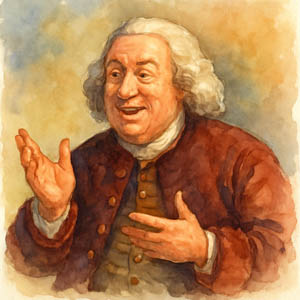 Born on this day in Lichfield, England, Samuel Johnson (1709–1784) faced childhood adversity with remarkable courage. Nearly blind in one eye and scarred by illness, he grew into a man of astonishing curiosity and determination—showing that a love of knowledge can light any darkness.
Born on this day in Lichfield, England, Samuel Johnson (1709–1784) faced childhood adversity with remarkable courage. Nearly blind in one eye and scarred by illness, he grew into a man of astonishing curiosity and determination—showing that a love of knowledge can light any darkness.
“All knowledge is of itself of some value. There is nothing so minute or inconsiderable, that I would not rather know it than not,” he declared. Johnson believed that every fact, no matter how small, held its own worth. Learning is a celebration of life.
He is best remembered for his monumental Dictionary of the English Language (1755), spending over seven years crafting 43,500 words into a masterpiece that shaped how English would be read, spoken, and understood. His work was so alive with wit and personality that readers found themselves smiling between definitions.
“The natural flights of the human mind are not from pleasure to pleasure, but from hope to hope,” he wrote in The Rambler. A lover of biography, his Lives of the Poets (1779–81) brimmed with sharp observations, humor, and reflective wisdom. “The applause of a single human being is of great consequence,” he once said—a reminder that one kind word can matter more than we imagine.
In 1764, Johnson founded The Literary Club, where writers and artists gathered to talk and laugh. Among them was James Boswell, whose warm and detailed The Life of Samuel Johnson (1791) captured Johnson’s brilliance, wit, and big-hearted conversations for future generations to enjoy.
“A man may be so much of everything that he is nothing of anything,” Johnson believed—yet he himself was joyfully, unmistakably something: diligent, witty, and filled with hope for what words could do.
 Knowledge keeps you young.💥
Knowledge keeps you young.💥
